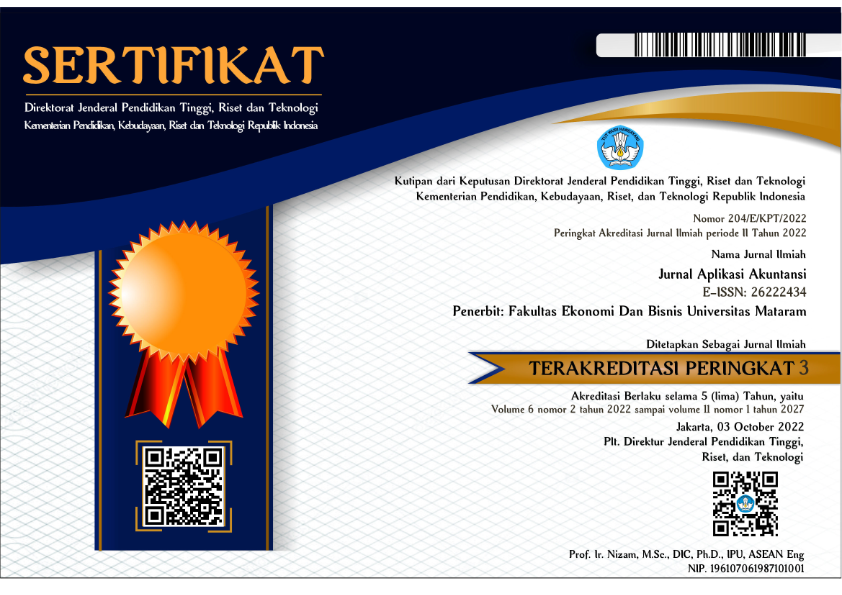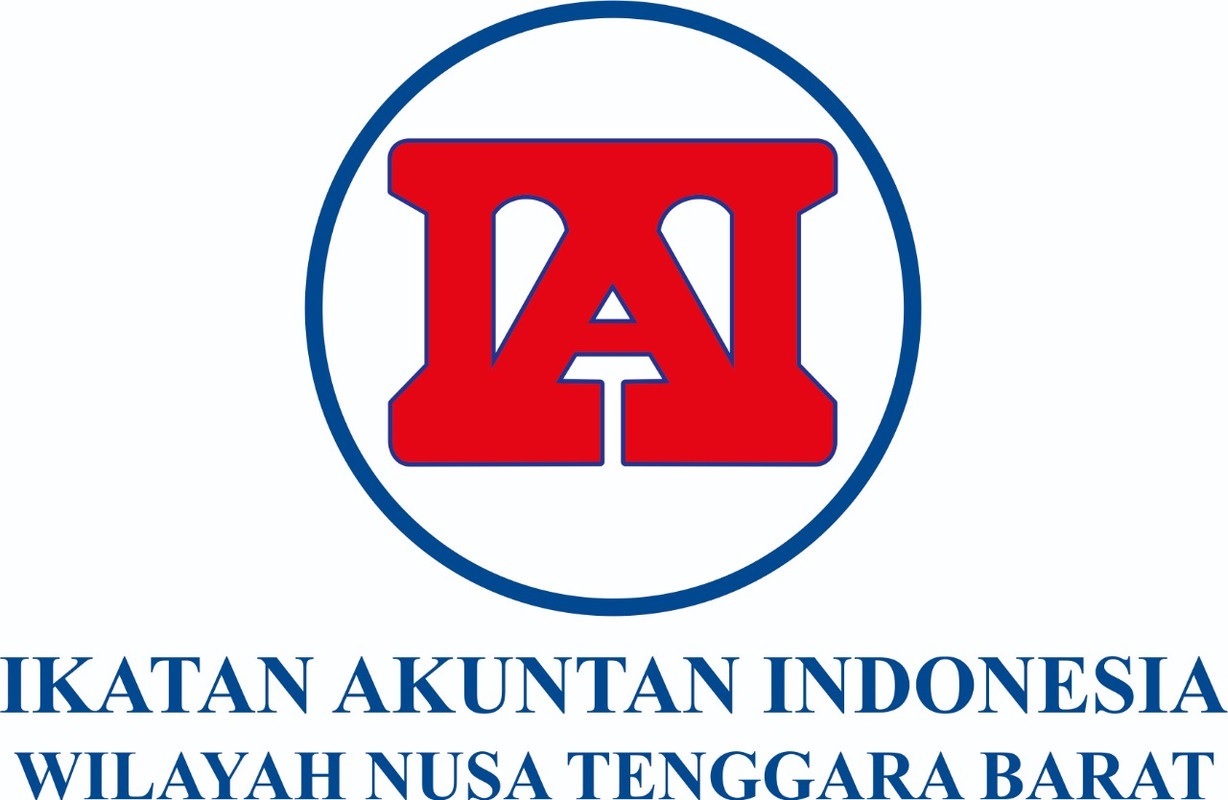APAKAH KINERJA KEBERLANJUTAN BERPERAN PADA MANAJEMEN LABA DI LIMA NEGARA ASEAN?
DOI:
https://doi.org/10.29303/jaa.v8i2.351Keywords:
sustainability performance, esg, accrual earnings management, ASEAN-5Abstract
This study aims to examine the role of sustainability performance on accrual earnings management in public companies in Southeast Asia. The research sample was on public companies in five ASEAN countries (Indonesia, Malaysia, Singapore, Thailand and Philippines) from 2017 to 2022. Sampling was carried out using a purposive sampling method, obtaining 1,218 company-year observations. The independent variable sustainability performance is measured using ESG scores while the dependent variable earnings management is measured using accrual earnings management. The results of this research provide empirical evidence that sustainability performance has no impact on accrual earnings management. Its means that companies with good sustainability performance tend not to carry out earnings management, whereas if earnings management occurs it is influenced by other factors outside of sustainability performance. This research has implications for investors in making investment decisions regarding companies that report ESG performance and the government regarding the quality of sustainability performance reporting.
References
Affan, M. ., Rosidi, & Purwanti, L. (2017). The Effect of Ownership Structure on the Quality of Financial Reporting Of Manufacturing Companies Listed In the IDX during the Period of 2013-2015. Imperial Journal of IIterdisciplinary Research, 3(7), 165–174.
Amake, C. C., & Akogo, O. U. A. (2021). Corporate Social Responsibility and Accrual-Based Earnings Management : Evidence from Nigeria. Mediterranean Journal of Social Sciences, 2117, 15–26.
Andayani, W., Hartono, J., Supriyadi, & Miharjo, S. (2018). The Effect of Family Ownership on Profit and Performance Company Management: Based on the Theory of Stewardship. Jurnal Aplikasi Manajemen, 16(2), 336–352. https://doi.org/http://dx.doi.org/10.21776/ub.jam.2018.016.02.17
Anderson, M. C., Hyun, S., & Warsame, H. A. (2014). Corporate Social Responsibility, Earnings Management, and Firm Performance: Evidence from Panel VAR Estimation. SSRN Electronic Journal. https://doi.org/10.2139/ssrn.2379826
Bebbington, J. (2005). Sustainable Development: A Review of the International Development, Business and Accounting Literature. SSRN Electronic Journal. https://doi.org/10.2139/ssrn.257434
Bebbington, J., & Larrinaga, C. (2014). Accounting and sustainable development: An exploration. Accounting, Organizations and Society, 39(6), 395–413. https://doi.org/10.1016/j.aos.2014.01.003
Bebbington, J., & Unerman, J. (2018). Achieving the United Nations Sustainable Development Goals: An enabling role for accounting research. Accounting, Auditing and Accountability Journal, 31(1), 2–24. https://doi.org/10.1108/AAAJ-05-2017-2929
Borralho, J. M., Hern´andez-Linares, R., Gallardo-V´azquez, D., & Paiva, I. C. de S. (2022). Environmental , social and governance disclosure ’ s impacts on earnings management : Family versus non-family firms. Journal of Cleaner Production, 379(December 2021). https://doi.org/https://doi.org/10.1016/j.jclepro.2022.134603
Buallay, A. (2019). Is sustainability reporting (ESG) associated with performance? Evidence from the Europian banking sector. Management of Environmental Quality: An International Journal, 30(1), 98–115. https://doi.org/https://doi.org/10.1108/MEQ-12-2017-0149
Buertey, S., Sun, E.-J., Lee, J. S., & Hwang, J. (2019). Corporate social responsibility and earnings management : The moderating effect of corporate governance mechanisms. Corporate Social Responsibility and Environmental Management, February, 1–16. https://doi.org/10.1002/csr.1803
Cai, Y., Jo, H., & Pan, C. (2012). Doing Well While Doing Bad? CSR in Controversial Industry Sectors. Journal of Business Ethics, 108(4), 467–480. https://doi.org/10.1007/s10551-011-1103-7
Çalişkan, A. Ö. (2014). How accounting and accountants may contribute in sustainability? Social Responsibility Journal, 10(2), 246–267. https://doi.org/10.1108/SRJ-04-2012-0049
Cho, E., & Chun, S. (2016). Corporate social responsibility, real activities earnings management, and corporate governance: evidence from Korea. Asia-Pacific Journal of Accounting & Economics, 23(4), 400–431. https://doi.org/10.1080/16081625.2015.1047005
Choi, B. B., Lee, D., & Park, Y. (2013). Corporate Social Responsibility, Corporate Governance and Earnings Quality: Evidence from Korea. Corporate Governance: An International Review, 21(5), 447–467. https://doi.org/10.1111/corg.12033
Cimini, R. (2015). How has the financial crisis affected earnings management? A European study. Applied Economics, 47(3), 302–317. https://doi.org/10.1080/00036846.2014.969828
Cortese, A. D. (1999). Education for Sustainability: The Need for a New Human Perspective. Second Nature, Inc.
Dechow, P. M., Sloan, R. G., & Sweeney, A. P. (1995). Detecting Earnings Management. The Accounting Review, 70(2), 193–225.
Ehsan, S., Tariq, A., Nazir, M. S., Shabbir, M. S., Shabbir, R., Lopez, L. B., & Ullah, W. (2022). Nexus between corporate social responsibility and earnings management: Sustainable or opportunistic. Managerial and Decision Economics, 43(2), 478–495. https://doi.org/10.1002/mde.3396
ElAlfy, A., Palaschuk, N., El-Bassiouny, D., Wilson, J., & Weber, O. (2020). Scoping the evolution of corporate social responsibility (CSR) research in the sustainable development goals (SDGS) era. Sustainability (Switzerland), 12(14). https://doi.org/10.3390/su12145544
Elkington, J. (1997). Cannibals with Forks: The Triple Bottom Line of 21st Century Business. Capstone Publishing Limited, Oxford.
Erin, O. A., & Bamigboye, O. A. (2022). Evaluation and analysis of SDG reporting: evidence from Africa. Journal of Accounting and Organizational Change, 18(3), 369–396. https://doi.org/10.1108/JAOC-02-2020-0025
Erin, O. A., Bamigboye, O. A., & Oyewo, B. (2022). Sustainable development goals (SDG) reporting: an analysis of disclosure. Journal of Accounting in Emerging Economies, 12(5), 761–789. https://doi.org/10.1108/JAEE-02-2020-0037
Febrianto, R., & Widiastuty, E. (2010). Hubungan Transaksi Dengan Pihak-Pihak Yang Memiliki Hubungan Istimewa Dan Kualitas Auditor Dengan Praktik Manajemen Laba. Jurnal Ilmiah Akuntansi Dan Bisnis, 1–18. https://ojs.unud.ac.id/index.php/jiab/article/view/2630
Gargouri, R. M., Shabou, R., & Francoeur, C. (2010). The Relationship Between corporate social performance and earnings management. Canadian Journal of Administrative Sciences / Revue Canadienne Des Sciences de l’Administration, 27(4), 320–334. https://doi.org/10.1002/cjas.178
Gavana, G., Gottardo, P., & Moisello, A. M. (2017). The effect of equity and bond issues on sustainability disclosure. Family vs non-family Italian firms. Social Responsibility Journal, 13(1), 126–142. https://doi.org/10.1108/SRJ-05-2016-0066
Grimaldi, F., Caragnano, A., Zito, M., & Mariani, M. (2020). Sustainability engagement and earnings management: The Italian context. Sustainability (Switzerland), 12(12), 1–16. https://doi.org/10.3390/SU12124881
Jones, J. J. (1991). Earnings Management During Import Relief Investigations. Journal of Accounting Research, 29(2), 193. https://doi.org/10.2307/2491047
Joseph, C. (2013). Understanding sustainable development concept in Malaysia. Social Responsibility Journal, 9(3), 441–453. https://doi.org/10.1108/SRJ-03-2012-0024
Kim, E. H., & Lu, Y. (2013). Corporate Governance Reforms Around the World and Cross-Border Acquisitions. SSRN Electronic Journal. https://doi.org/10.2139/ssrn.2265263
Lourenço, I. C., Callen, J. L., Barnco, M. C., & Curto, J. D. (2014). The Value Relevance of Reputation for Sustainability Leadership. Journal of Business Ethics, 119(1), 17–28. http://www.jstor.org/stable/42921271
Martínez-Ferrero, J., Banerjee, S., & García-Sánchez, I. M. (2016). Corporate Social Responsibility as a Strategic Shield Against Costs of Earnings Management Practices. Journal of Business Ethics, 133(2), 305–324. https://doi.org/10.1007/s10551-014-2399-x
McWilliams, A., & Siegel, D. (2000). Corporate social responsibility and financial performance: correlation or misspecification? Strategic Management Journal, 21(5), 603–609. https://doi.org/10.1002/(SICI)1097-0266(200005)21:5<603::AID-SMJ101>3.0.CO;2-3
Muttakin, M. B., Khan, A., & Azim, M. I. (2015). Corporate social responsibility disclosures and earnings quality. Managerial Auditing Journal, 30(3), 277–298. https://doi.org/10.1108/MAJ-02-2014-0997
Nechita, E. (2021). Analysis on Sustainability Reporting and Earnings Management Practices . Evidence from An Emerging Economy. Preprints.Org, 2021060203., June, 1–18. https://doi.org/https://doi.org/10.20944/preprints202106.0203.v1
Nguyen, L. T. (2022). The relationship between corporate sustainability performance and earnings management: evidence from emerging East Asian economies. Journal of Financial Reporting and Accounting. https://doi.org/10.1108/JFRA-09-2021-0302
Papaspyropoulos, K. G., & Karamanolis, D. (2016). Drivers and Barriers of Sustainability Reporting in the Greek Public Forest Service. Open Journal of Accounting, 05(03), 35–44. https://doi.org/10.4236/ojacct.2016.53005
Pertiwi, M. I. (2022). Analisis Pengaruh Kinerja Keberlanjutan Terhadap Kinerja Keuangan Selama Masa Pandemi Covid-19. Universitas Gadjah Mada.
Prior, D., Surroca, J., & Tribó, J. A. (2008). Are Socially Responsible Managers Really Ethical ? Exploring the Relationship Between Earnings Management and Corporate Social Responsibility. Corporate Governance: An International Review, 16(3), 160–177. https://doi.org/10.1111/j.1467-8683.2008.00678.x
Rahman, A., & Hutagaol, Y. (2008). Manajemen Laba Melalui Akrual Dan Aktivitas Real Pada Penawaran Perdana Dan Hubungannya Dengan Kinerja Jangka Panjang (Studi Empiris Pada Bej). Jurnal Akuntansi Dan Keuangan Indonesia, 5(1), 1–29. https://doi.org/10.21002/jaki.2008.01
Renko, S. (2018). The Concept of Sustainable Development. In The Sustainable Marketing Concept in European Smes: Insights from the Food and Drink Industry (pp. 29–52). Emerald Group Publishing Ltd. https://doi.org/10.1108/978-1-78754-038-520180003
Rosati, F., & Faria, L. G. D. (2019). Addressing the SDGs in sustainability reports: The relationship with institutional factors. Journal of Cleaner Production, 215, 1312–1326. https://doi.org/10.1016/j.jclepro.2018.12.107
Tran, M., Beddewela, E., & Ntim, C. G. (2021). Governance and sustainability in Southeast Asia. Accounting Research Journal, 34(6), 516–545. https://doi.org/10.1108/ARJ-05-2019-0095
UN. (2015). United Nations General Assembly. In Transforming our world: the 2030 Agenda for Sustainable Development. https://doi.org/10.1163/ej.9789004180048.i-962.150
United Nations, Department of Economic and Social Affairs, P. D. (2022). World Population Prospects 2022. https://population.un.org/wpp/Graphs/Probabilistic/POP/TOT/900
Unruh, G., Kiron, D., Kruschwitz, N., Reeves, M., Rubel, H., & zum Felde, A. M. (2016). Investing For a Sustainable Future. In MIT Sloan Management Review.
Velayutham, E. (2018). Sustainability disclosure and earnings management. In Research Handbook of Finance and Sustainability. Edward Elgar Publishing. https://doi.org/10.4337/9781786432636.00037
Velte, P. (2019). The Bidirectional Relationship Between ESG Performance and Earnings Management – Empirical Evidence from Germany. Journal of Global Responsibility, 10(4), 322–338. https://doi.org/10.1108/JGR-01-2019-0001
Vernando, A., & Ainy, R. N. (2022). Perusahaan Keluarga dan Manajemen Laba. Reviu Akuntansi Dan Bisnis Indonesia, 6(2), 114–124. https://doi.org/10.18196/rabin.v6i2.15856
Vogt, M., & Weber, C. (2019). Current challenges to the concept of sustainability. Global Sustainability, 2. https://doi.org/10.1017/sus.2019.1
Worldometer.info. (2020). Current World Population. https://www.worldometers.info/world-population/
Downloads
Published
How to Cite
Issue
Section
License
Copyright (c) 2024 Nike Yolanda, Erna Widiastuty

This work is licensed under a Creative Commons Attribution-NonCommercial-ShareAlike 4.0 International License.









